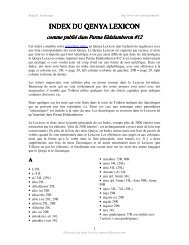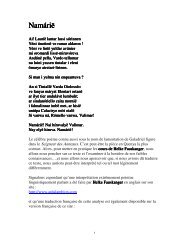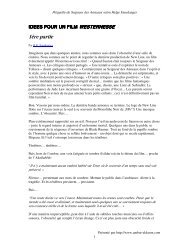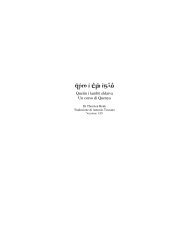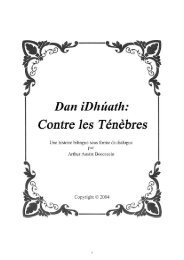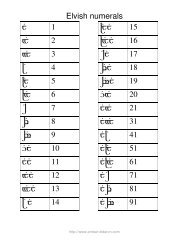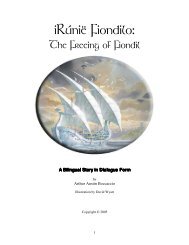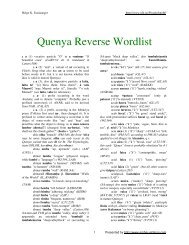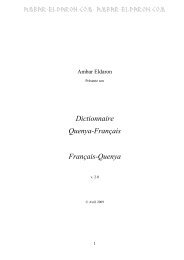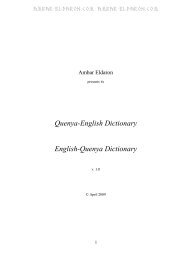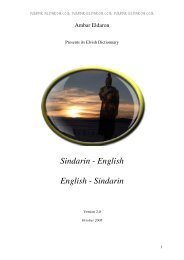English – Quenya - Ambar Eldaron
English – Quenya - Ambar Eldaron
English – Quenya - Ambar Eldaron
Create successful ePaper yourself
Turn your PDF publications into a flip-book with our unique Google optimized e-Paper software.
Helge K. Fauskanger http://www.uib.no/People/hnohf/<br />
DAY aurë (sunlight; Etym gives arë, ari-<br />
instead). The word aurë is defined as “a day (of<br />
light), a day of special meaning or festival”;<br />
allative aurenna “upon the day” (VT49:45). Cf.<br />
also: arya (= 12 hours), ré (= 24 hours, counted<br />
from sunset to sunset, allative rénna in<br />
VT49:45), sana (= also 24 hours, but this is<br />
"Qenya"), DAYTIME arië, EARLY DAY<br />
†amaurëa (dawn), DAYLIGHT <strong>–</strong> LT1:254 gives<br />
calma, but this word is defined "lamp" in LotR.<br />
LAST DAY OF YEAR quantien, FIRST DAY<br />
(meaning obscure, possibly first day of year)<br />
minyen. (In the entry YEN of the Etymologies as<br />
printed in LR, minyen is seemingly glossed both<br />
"first day" and "first year", but according to<br />
VT46:23, only "first day" is correct.)<br />
DAYSPRING tuilë <strong>–</strong>AR 1 /VT45:6,<br />
Silm:229/234/439, LotR:1141, LT1:250, MC:223,<br />
YEN<br />
DEAD firin (= dead by natural cause),<br />
qualin (related to qualmë "agony, death" and<br />
probably has darker connotations than firin),<br />
vanwa (departed, lost, past, gone, vanished, no<br />
longer to be had), hessa (withered). DEAD<br />
BODY loico (corpse) <strong>–</strong>KWAL, PHIR, MC:223,<br />
LT1:255, WJ:366<br />
DEAL WITH mahta- (fight, handle,<br />
manage, wield, wield a weapon); pa.t. mahtanë<br />
is attested. <strong>–</strong>MAK/VT39:11, VT47:6, 18, 19,<br />
VT49:10<br />
DEAR melda (beloved), melin, moina<br />
(familiar), #melya (isolated from Melyanna "dear<br />
gift", Melian's <strong>Quenya</strong> name), valda (worth,<br />
worthy). Cf. also the "suffix of endearment" -ya<br />
mentioned in UT:418: Anardilya *"dear Anardil"<br />
(UT:174). DEAR KINSMAN (form of address)<br />
tyenya (literally “my thou”, with tye as an<br />
intimate 2nd person pronoun reserved for<br />
relatives and close friends). <strong>–</strong>MEL, MOY,<br />
Silm:434, GL:23, VT49:51<br />
DEATH qualmë, unqualë (agony;<br />
according to VT45:24, Tolkien changed this word<br />
to anqualë), #fírië, #effírië (basically<br />
"expiration", attested with the ending -mmo in<br />
fíriemmo, effíriemmo "of our death"), nuru,<br />
older ñuru (personalized Nuru = Mandos), fairë<br />
(natural death [as act]) (Note: fairë also means<br />
"radiance" and "phantom", and even [in LT1:250]<br />
"free"), urdu <strong>–</strong>KWAL/LT1:264, VT43:34,<br />
ÑGUR/VT46:4, PHIR, LT2:342<br />
DEBT #rohta (attested in pl. form rohtar).<br />
Used in draft version of Tolkien's <strong>Quenya</strong> Lord's<br />
prayer, this word may refer to moral rather than<br />
financial "debt"; it may also cover "trespass".<br />
This is probably also true of variant words for<br />
"debt" occurring in other versions: #lucassë,<br />
#lucië, #luhta (all are attested with the ending -<br />
mmar to express "our debts/trespasses"). <strong>–</strong><br />
VT43:19<br />
DEBTOR #rocindo, #rucindo (isolated<br />
from rocindollomman, rucindollomman "from<br />
our debtors"). Used in one of the draft versions<br />
of Tolkien's <strong>Quenya</strong> version of the Lord's Prayer,<br />
the "debtors" denoted by this word may be<br />
sinners rather than simply people owing others<br />
money. Another version of the Prayer has<br />
#lucando or #lucindo as the word for "debtor"<br />
or "one who trespasses" (attested in the plural:<br />
lucandor, lucindor). <strong>–</strong>VT43:20<br />
DECISION, see CONSIDERING A<br />
MATTER (with a view to decision)<br />
DECIMAL SYSTEM (in counting)<br />
maquanotië. Another source gives a word for<br />
"decimal system" as caistanótië, incorporating<br />
caista "10th", but since Tolkien later decided<br />
that the initial sound of words having to do with<br />
"10" should be qu- rather than c-, we must<br />
apparently read *quaistanótië. But maquanótië<br />
(a form requiring no changes) may be preferred.<br />
<strong>–</strong>VT47:10, VT48:11<br />
DEED carda <strong>–</strong>PE17:51<br />
DECLIVITY pendë (downslape, slope) <strong>–</strong><br />
PEN<br />
DEEP núra, tumna (low-lying, low,<br />
profound, dark or hidden). DEEP POOL lón,<br />
lónë (pl. lóni given) (river-[?feeding] well), DEEP<br />
VALLEY tumbo (dark vale); DEEP VALE imbë<br />
(dell) (Note: imbë is also one form of the<br />
preposition "between"); DEEP SHADOW huinë<br />
(gloom). <strong>–</strong>NŪ, TUB, VT48:28, VT45:18, VT41:8<br />
DEFORMED CREATURE ulundo<br />
(hideous creature, monster) <strong>–</strong>ÚLUG<br />
DELIVER (= *save) etelehta- (the<br />
alternative verb etrúna-, eterúna- was possibly<br />
abandoned by Tolkien; see FREE [verb]). <strong>–</strong><br />
VT43:23, VT44:9<br />
DELL imbë (deep vale) (Note: imbë is<br />
also the preposition "between"), nal, nallë (dale)<br />
<strong>–</strong>VT45:18, LT1:261<br />
DEMAND can- (so when used with things<br />
as object, in effect = ask for; otherwise<br />
command, order) <strong>–</strong>PM:361-362 (where only a<br />
stem KAN is mentioned)<br />
DEMON rauco (pl. #raucar, isolated from<br />
Valaraukar (Valaraucar) "Balrogs". LT1:250<br />
gives araukë; WJ:415 has rauco and arauco,<br />
defined as "a powerful, hostile, and terrible<br />
creature".) See also ORC. <strong>–</strong>RUK, Silm:436,<br />
WJ:415<br />
DENTAL SERIES tincotéma (t-series) <strong>–</strong><br />
LotR:1154<br />
Wordlist last updated July 5th, 2008 20 Presented by http://www.ambar-eldaron.com



